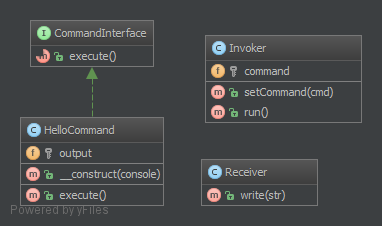3.2. Command¶
3.2.1. Purpose¶
To encapsulate invocation and decoupling.
We have an Invoker and a Receiver. This pattern uses a “Command” to delegate the method call against the Receiver and presents the same method “execute”. Therefore, the Invoker just knows to call “execute” to process the Command of the client. The Receiver is decoupled from the Invoker.
The second aspect of this pattern is the undo(), which undoes the method execute(). Command can also be aggregated to combine more complex commands with minimum copy-paste and relying on composition over inheritance.
3.2.2. Examples¶
- A text editor : all events are Command which can be undone, stacked and saved.
- Symfony2: SF2 Commands that can be run from the CLI are built with just the Command pattern in mind
- big CLI tools use subcommands to distribute various tasks and pack them in “modules”, each of these can be implemented with the Command pattern (e.g. vagrant)
3.2.3. UML Diagram¶

3.2.4. Code¶
You can also find these code on GitHub
CommandInterface.php
1 2 3 4 5 6 7 8 9 10 11 12 13 14 15 | <?php
namespace DesignPatterns\Behavioral\Command;
/**
* class CommandInterface
*/
interface CommandInterface
{
/**
* this is the most important method in the Command pattern,
* The Receiver goes in the constructor.
*/
public function execute();
}
|
HelloCommand.php
1 2 3 4 5 6 7 8 9 10 11 12 13 14 15 16 17 18 19 20 21 22 23 24 25 26 27 28 29 30 31 32 33 34 35 36 | <?php
namespace DesignPatterns\Behavioral\Command;
/**
* This concrete command calls "print" on the Receiver, but an external
* invoker just know he can call "execute"
*/
class HelloCommand implements CommandInterface
{
/**
* @var Receiver
*/
protected $output;
/**
* Each concrete command is builded with different receivers.
* Can be one, many, none or even other Command in parameters
*
* @param Receiver $console
*/
public function __construct(Receiver $console)
{
$this->output = $console;
}
/**
* execute and output "Hello World"
*/
public function execute()
{
// sometimes, there is no receiver and this is the command which
// does all the work
$this->output->write('Hello World');
}
}
|
Receiver.php
1 2 3 4 5 6 7 8 9 10 11 12 13 14 15 16 17 | <?php
namespace DesignPatterns\Behavioral\Command;
/**
* Receiver is specific service with its own contract and can be only concrete
*/
class Receiver
{
/**
* @param string $str
*/
public function write($str)
{
echo $str;
}
}
|
Invoker.php
1 2 3 4 5 6 7 8 9 10 11 12 13 14 15 16 17 18 19 20 21 22 23 24 25 26 27 28 29 30 31 32 33 34 35 36 | <?php
namespace DesignPatterns\Behavioral\Command;
/**
* Invoker is using the command given to it.
* Example : an Application in SF2
*/
class Invoker
{
/**
* @var CommandInterface
*/
protected $command;
/**
* In the invoker we find this kind of method for subscribing the command.
* There can be also a stack, a list, a fixed set...
*
* @param CommandInterface $cmd
*/
public function setCommand(CommandInterface $cmd)
{
$this->command = $cmd;
}
/**
* executes the command
*/
public function run()
{
// here is a key feature of the invoker
// the invoker is the same whatever is the command
$this->command->execute();
}
}
|
3.2.5. Test¶
Tests/CommandTest.php
1 2 3 4 5 6 7 8 9 10 11 12 13 14 15 16 17 18 19 20 21 22 23 24 25 26 27 28 29 30 31 32 33 34 35 36 37 | <?php
namespace DesignPatterns\Behavioral\Command\Tests;
use DesignPatterns\Behavioral\Command\Invoker;
use DesignPatterns\Behavioral\Command\Receiver;
use DesignPatterns\Behavioral\Command\HelloCommand;
/**
* CommandTest has the role of the Client in the Command Pattern
*/
class CommandTest extends \PHPUnit_Framework_TestCase
{
/**
* @var Invoker
*/
protected $invoker;
/**
* @var Receiver
*/
protected $receiver;
protected function setUp()
{
$this->invoker = new Invoker();
$this->receiver = new Receiver();
}
public function testInvocation()
{
$this->invoker->setCommand(new HelloCommand($this->receiver));
$this->expectOutputString('Hello World');
$this->invoker->run();
}
}
|